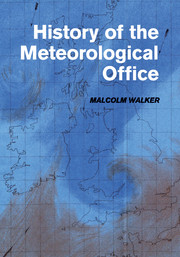Book contents
- Frontmatter
- Contents
- Illustrations
- Foreword
- Additional Commentary
- Acknowledgements
- Abbreviations
- 1 Seeds Are Sown
- 2 Statistics and Storms
- 3 Inquiry and Criticism
- 4 The Fight over Forecasts
- 5 Squalls and Settled Spells
- 6 The Emergence of Science
- 7 A Decade of Change
- 8 The Great War
- 9 The Inter-War Period
- 10 The Clouds of War
- 11 Aftermath of War to Forecasting by Numbers
- 12 Global Meteorology
- 13 Winds of Change
- Index
- References
11 - Aftermath of War to Forecasting by Numbers
Published online by Cambridge University Press: 05 December 2011
- Frontmatter
- Contents
- Illustrations
- Foreword
- Additional Commentary
- Acknowledgements
- Abbreviations
- 1 Seeds Are Sown
- 2 Statistics and Storms
- 3 Inquiry and Criticism
- 4 The Fight over Forecasts
- 5 Squalls and Settled Spells
- 6 The Emergence of Science
- 7 A Decade of Change
- 8 The Great War
- 9 The Inter-War Period
- 10 The Clouds of War
- 11 Aftermath of War to Forecasting by Numbers
- 12 Global Meteorology
- 13 Winds of Change
- Index
- References
Summary
Sir Napier Shaw died on 23 March 1945, aged 91. In his lifetime, meteorology had been transformed, partly through his scientific insight, inspiration and leadership, but also through technological developments such as wireless telegraphy, aircraft, the radiosonde and radar. He had given the UK a leading position in international meteorology and laid the foundations which had been built upon in peacetime and wartime to form the institution the Meteorological Office had become by 1945, a scientific and technological body of national and international importance.
Further Reorganization of the Meteorological Office
Hardly had the war ended when there came yet another reorganization of the Office, this one the outcome of an inquiry into the constitution of the Scientific Civil Service. The inquiry had been carried out during the war by a committee chaired by Sir Alan Barlow, a Treasury under-secretary, and its recommendations had been presented to Parliament in September 1945 in a White Paper (Cmd. 6679). The Office was reorganized on the lines the Barlow Committee recommended. Out went the grades that had been introduced in the 1930s in response to the report of the Carpenter Committee (see Chapter 9). In came the grades of Scientific Officer, Experimental Officer and Scientific Assistant, and with them came revised scales of pay.
- Type
- Chapter
- Information
- History of the Meteorological Office , pp. 307 - 353Publisher: Cambridge University PressPrint publication year: 2011



